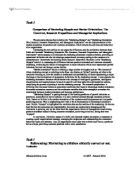Procter and Gamble are a multinational chain and have countless products. Each product has its own line extension which competes with each other even though they belong to the same company. For example, P & G have many brands of shampoos. Had they not introduced all the many brands of shampoos a competitor would have done so, thus taking over P & G’s market.
Levitt says that every industry could be qualified as a ‘growth industry’ at some point in time. For companies to ensure continued evolution, they must define their industries broadly to take advantage of growth opportunities. They must determine and act on their customers' needs and desires, not take demand for granted. An organization must learn to think of itself not as producing goods or services but as doing the things that will make people want to do business with it otherwise it can become obsolete.
In light of this, an example in article was of the buggy whip industry that became obsolete due to lack of product improvement. However, the industry might have survived if buggy whip makers had redefined their business in accordance with the emerging technologies and cars. That would have lead them to move into automotive products, like fan belts, with more of a future.
Likewise, dry cleaning industry was also a growth industry at one time with lavish prospects. Yet, synthetic fibers and chemical additives cut the need for dry cleaning. This is not a better way of cleaning, just more innovative and customer oriented while being futuristic, simultaneously.
Levitt dismisses the notion of a ‘growth industry’, arguing that the cycle is created by four conditions: A belief that growth is guaranteed by an expanding, affluent population; the belief that no competitive substitutes exist for the industry’s main product; excessive faith in mass production; and dangers of research and development. Levitt explains these four factors in detail, illustrating his insights with examples from the petroleum, automobile, and electronics industries.
The author mentions that an expanding market keeps the manufacturer from having to think very hard or imaginatively. If thinking is an intellectual response to a problem, then the absence of a problem leads to the absence of thinking. For instance, the authors believes that in 25 years time the petroleum industry will be in the same position that railroads are in currently. The petroleum industry has confined itself to the technology of oil exploration, production, and refining. The single product improvement, which is tetraethyl lead, was established by other industries, specifically General Motors and DuPont. Customers want new products all the time and that is exactly what other major innovators, like multi-pump gasoline stations, are doing. Thus, increasing the possibility of overtaking the petroleum industry market.
Many businesses make their decisions based on current circumstances. They do not think about what will likely occur in their industry in the future. One reason that short sightedness is so common is that people feel that they can not accurately predict the future. When companies believe that their products have no rivals these companies become vulnerable to dramatic innovations from outside industries. These companies are smaller and relatively newer who focus more on customers’ needs rather than products. For example, in the time when kerosene lamps were used as light source, oil companies would compete with and against each other to improve characteristics of kerosene. And out of the blue, Thomas Edison invented a light bulb, which was not linked to the oil companies in anyway. Moreover, in another example, space heaters became obsolete on the introduction of coal burning central heating systems.
The author tells that oil industry had never been a continuously strong growth industry, rather it was saved by innovations and developments not of its own making.
Few of us can resist the prospect of the increased profits that come with steeply declining unit costs. But focusing on mass production emphasized company needs than customers needs, once again. To explain further, only 57 of Chevrolet’s 7000 dealers provide night maintenance service. Motorists repeatedly express their dissatisfaction with servicing and hesitation in buying car under current selling setup.
In another instance, Henry Ford was the initiator of mass production due to the invention of assembly line. As he once said “…they can have any car as long as it’s black and Model-T”, Ford proved his stubbornness in mass production. But Theodore Levitt believes that Ford actually invented the assemble line because he had concluded that at $500 he could sell millions of cars. Hence, mass production was the result and not the cause of his low prices. The author clarifies that Ford emphasized on this point but production oriented businesses refused to hear the message and ‘extended operations to improve the article’.
Furthermore, Levitt suggests that because of mass production product fails to adapt to the constantly changing patterns of consumer needs and tastes. For instance, oil is trying to improve hydrocarbon fuels rather than developing fuels that fulfill user needs. He gives examples of what other non-petroleum companies are working on, including fuel cells, i.e. internal combustion engines that run on water; batteries, i.e. electric storage batteries to power automobiles; and solar power plants i.e. solar energy which will give rise to solar-powered cars, none of which are dependant on oil.
Levitt touches a very enlightening aspect, ‘creative destruction’. Creative destruction is that companies will have to destroy their own highly profitable assets in order to produce products that will satisfy customer needs and wants before other industries take charge. Management must diversify from the usual act of production orientation. According to Levitt, “no amount of wishful thinking can save them from the necessity of engaging in this form of creative destruction”.
The typical belief that research and development will ensure company growth is also a hindrance in industry innovation and advancement. The issue is not that companies do not pay attention to research and development, rather it is that they pay too much attention. This causes their focus to be more strictly on product research, development, and perfection. Because electronic products are very complex, management creates a selective bias in favor of research and production at the expense of marketing. Hence, the company tends to view itself as making things rather than satisfying customer needs.
The author goes on to talk about the ‘stepchild treatment’. Again he gives the example of the oil industry whose focus is improvement in production than customers, thus resulting in marketing receiving a stepchild treatment. Under the heading of some list of articles, oil industry’s major functional areas were listed, except marketing, once again illustrating the stepchild treatment of marketing.
Lastly, case after case, industries have fallen under the shadow of mismanagement. What usually gets emphasized is selling, not marketing. This is a mistake, because selling focuses on the needs of the seller, whereas marketing concentrates on the needs of the buyer. An organization must learn to think of itself not as producing goods or services but as doing the things that will make people want to do business with it. And in every case, the management of an organization is responsible for creating an environment that reflects this mission.







